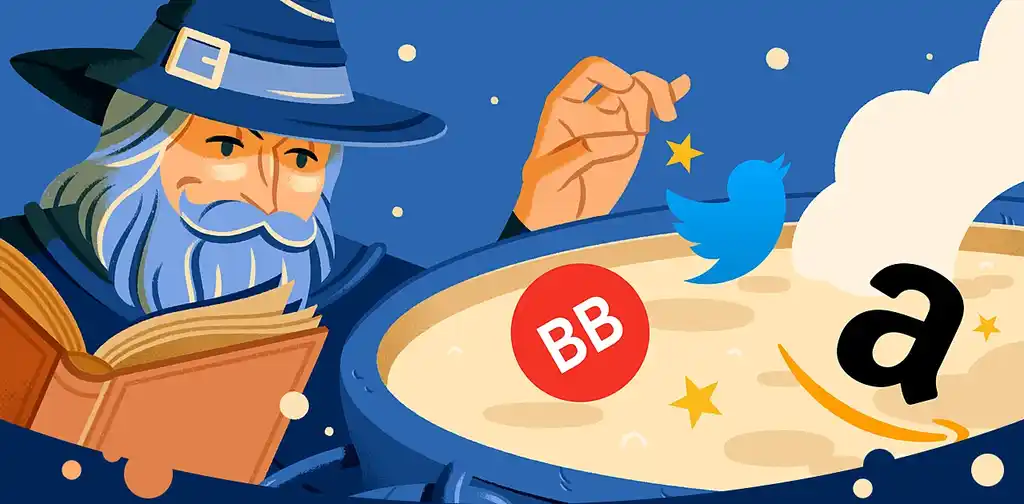Blog •
Posted on Apr 11, 2024
Live: Transitioning Into Book Marketing
Ricardo Fayet
Reedsy co-founder and Chief Marketing Officer, Ricardo Fayet has worked with hundreds of authors on their launches and marketing campaigns. He is the author of two bestselling guides on marketing for authors, and a regular presenter at the largest writers' conferences.
View profile →Below is the transcript from our live presentation on how to transition into book marketing, held on April 2, 2024 and led by Reedsy co-founder, Ricardo Fayet. The talk gives insight on how to gain the necessary skills and knowledge to be a successful marketer in the book industry, especially working with indie authors.
This transcript has been edited for length and clarity.
Skip to 4:15 for the start of the talk.
A high demand for book marketers
Ricardo: There is a lot of demand for book marketing in the author world. More and more authors are making six, seven figures and publishing several books a year — basically running their own publishing company — and they need marketing help because, when you get to that stage, you can’t keep doing everything on your own.
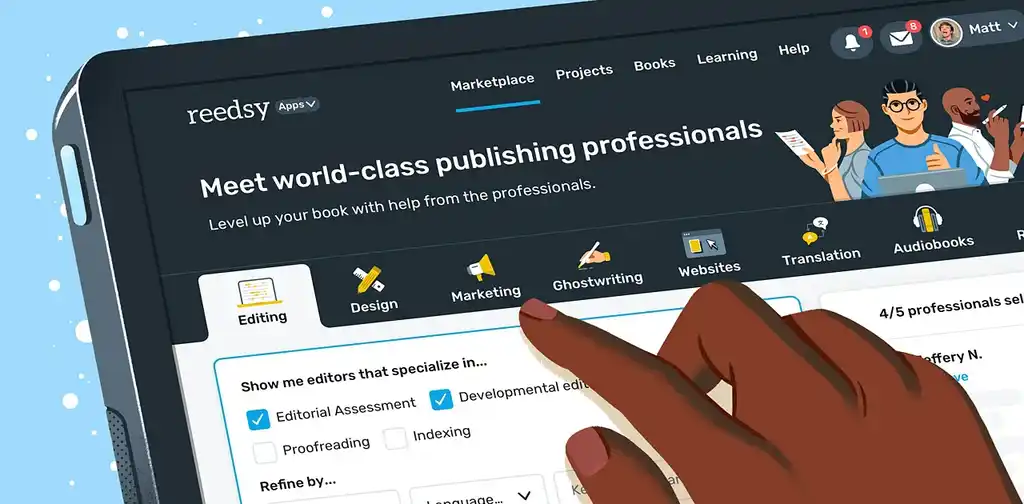
JOIN OUR NETWORK
Supercharge your freelance career
Find projects, set your own rates, and get free resources for growing your business.
So, in this Reedsy Live, we're going to be talking about how to transition into book marketing if you already have some kind of digital marketing skills, because it is a niche that, if you like books and authors, you're going to love working in. And it’s a niche that is only going to keep growing in the next few years.
If you want to read more from Ricardo, you can download How to Market a Book for free or find his book on Amazon ads here.
Prerequisites: skills and qualifications
As the title of this talk suggests, “transition” into book marketing indicates that you need to come from somewhere. So, to start, we're going to talk about what you need to have before you even consider transitioning into book marketing.
I’ve personally moonlighted as a marketer here on Reedsy for a couple of years to get a feel for what it's like to work directly with authors.
👀 Check out Ricardo’s profile here.
Not only that, but I've also trained one of our current marketers on the Reedsy Marketplace, who also happens to be my partner, who comes from a background in digital marketing. We worked together for around six months, and I tried to show her everything that we'll be going through in this presentation. Of course, I don't have six months to go over all this, so I'm going to share a lot of additional resources, and you will have a lot of homework to do if you want to seriously go into book marketing.
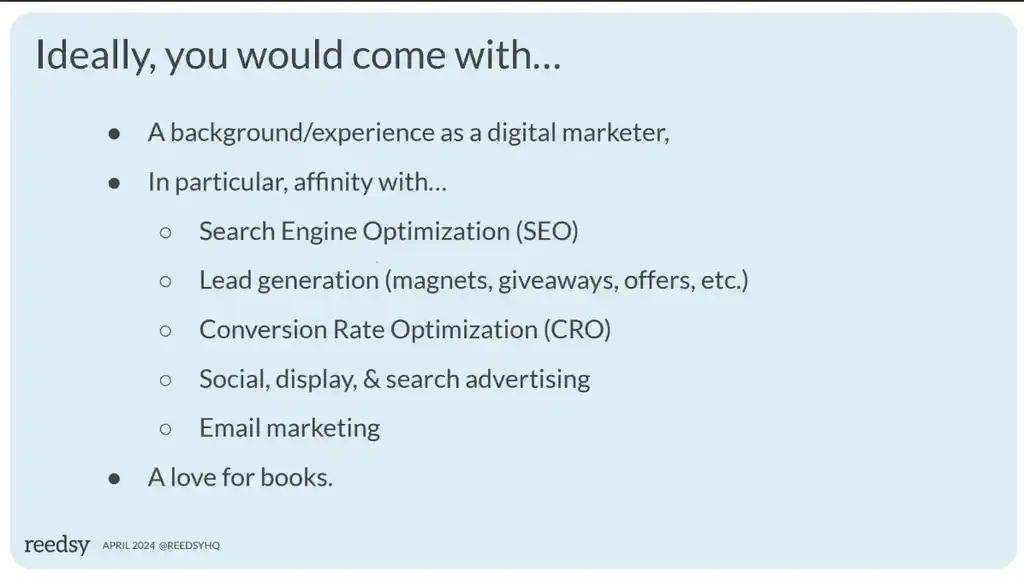
You would be best placed to transition into book marketing if you already come with experience as a digital marketer. Here, both ‘digital’ and ‘marketer’ are important, maybe working on a company’s website, their analytics, their online ads, et cetera.
In particular, when it comes to marketing books, it’s important that you have an affinity for digital marketing channels and tactics like search engine optimization, as Amazon and other retailers are essentially places where readers go and search for books. It’s really going to help you if you're already familiar with Google, YouTube, or Bing SEO, et cetera.
Same thing goes for lead generation. It’ll be helpful if you've worked in a lead generation role, using things like lead magnets and giveaways offers, or, if you've worked with conversion rate optimization, turning leads into paying customers. You’ll need to get leads to come across your book sales pages, and then you need to turn them into readers.
One of the easiest ways to get into book marketing is to run ads for authors. So, if you have knowledge of Meta (Facebook and Instagram) or Amazon ads, that's going to come in super handy. And, if you have experience with other advertising platforms like Google, it's easy enough to learn a new one.
Finally, if you have experience with email marketing, almost all authors who make a living writing have a mailing list and a newsletter. Email marketing becomes a big part of their day to day job and one where they could use the help of an external marketer.
And, of course, you’d need to have a love for books, right? If you're going to be marketing books for a living, then you probably want to have an affinity with books and the publishing industry in general.
Bonus points
In addition to these prerequisites, you could also have knowledge of the Amazon store ecosystem. If you've worked with Amazon sellers or vendors in the past, that's going to be really helpful because authors are essentially vendors on Amazon. They have slightly different accounts, but they work in a very similar way.
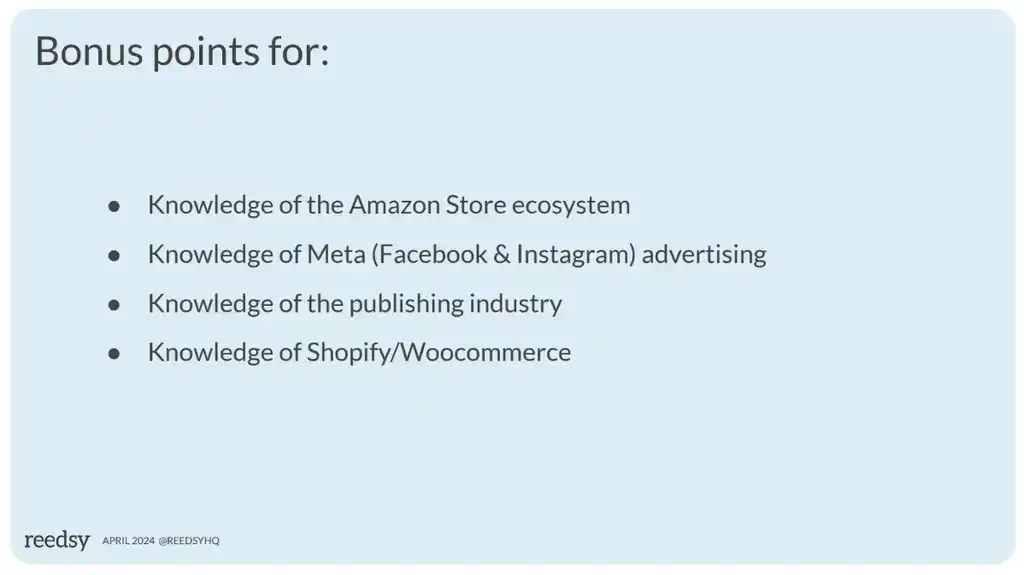
We’ve already talked about social advertising, and if you have knowledge of the publishing industry, obviously that's going to be super valuable too.
And, this is a more niche recent one, but if you have knowledge of Shopify, WooCommerce, or other direct stores like that, that's also going to be an interesting specialization, because more and more authors are setting up their own direct sales stores through Thrivecart or other solutions to sell their books directly to readers. That’s an area where almost all of them need help, because it's not necessarily something they're familiar with. And it takes a lot of work and knowledge of conversion rate optimization and analytics to set up those stores.
If you don't have any of these bonus points, don't worry about it. What's important is that you should come at least with a good knowledge of digital marketing and ideally a few years of experience under your belt. If you don't know much about the publishing industry, that's fine; you can learn about it.
The publishing industry
The first step to learning about the publishing industry is to look at the different journeys authors take to publishing their books. You’ll most likely work with authors who self-publish, so what does the typical journey look like for these authors?
First, they're going to write their book, obviously. Then they're going to hire someone to help them polish it, work through several rounds of editing, then add a visual element in the form of cover design, typesetting, formatting, proofreading, and distribution. Marketing runs throughout because, as we always say at Reedsy, you should start thinking about marketing as an author as soon as you're starting to write your book.
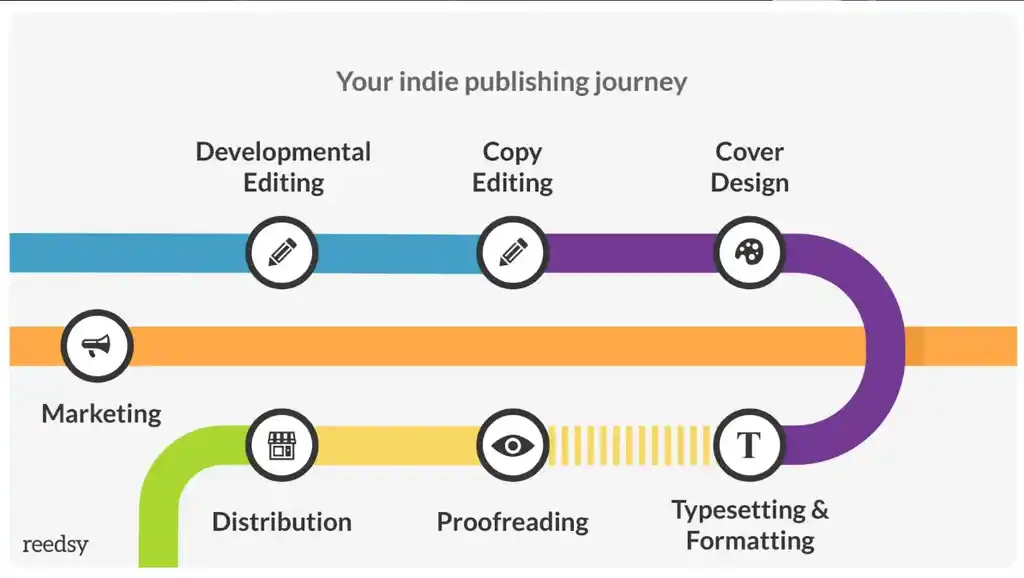
As a marketer, if you come in once the book is published, there are still a lot of things that you can do. Before the invention of ebooks, books used to go out of print after a certain period of time, and they wouldn't be available to readers, so if you came in late as a marketer, there would be no product to market. Thankfully, nowadays with ebooks and print on demand, books don't go out of print. They're almost always available so it's never too late to resuscitate the marketing. However, it is a lot easier to market a book if you enter early into the publishing process and if you get to work with that author even while they're writing the book.
In traditional publishing, it's more complicated because the whole process — from finding an agent to sending a book to print and out into bookshops — can take several years. Usually it takes at least one year, but usually it takes a couple of years, which means that it's a much slower process.
What happens also with authors who are traditionally published is that they have a lot less control over their books. They basically sell their rights to the publisher, and the publisher then takes care of pretty much everything, including the marketing. Now, a lot of traditionally published authors still seek outside marketing help, because traditional publishers don't do a huge job of marketing nowadays, especially for their newer authors. They're publishing hundreds of books every year, so they can’t assign huge marketing resources to every single one of them.
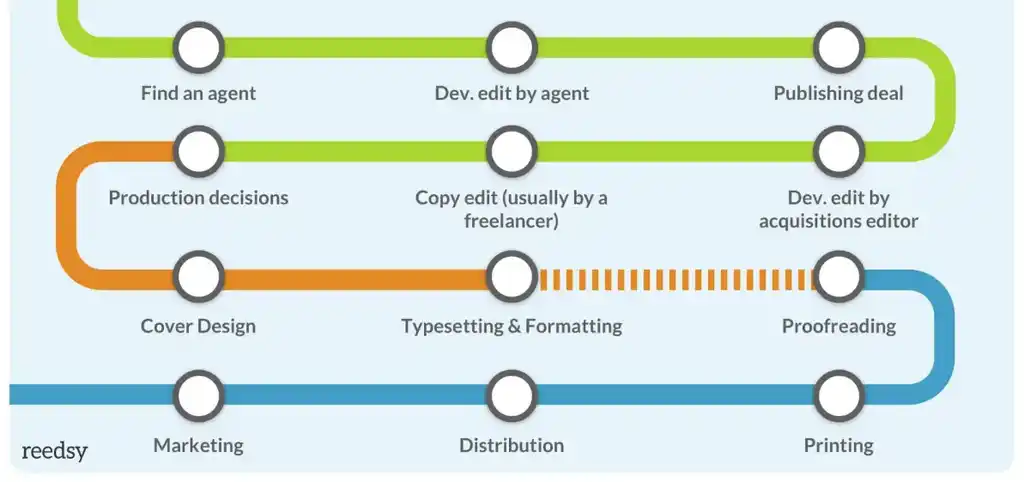
As a marketer, you need to know this distinction between indie publishing and traditional publishing, because you are going to be able to help an indie author in a completely different way than you're going to be able to help a traditional published author. A traditionally published author doesn't have any control over price, their Amazon metadata, their cover, or their book description. And they have a much smaller margin on their sales. They make around 10 to 20% royalties on the list price of the book, which excludes some marketing channels. For example, you can’t really afford to run Amazon or Facebook ads if you're a traditionally published author, because you don't have that profit margin to play with that an indie author would. An indie author makes 70% royalties on ebook sales and usually between 25 to 50% royalties on print list price. That gives them a much bigger margin to play with. They can afford to spend $2 to $3 dollars to generate a sale because they're going to make that money back. A traditionally published author is not going to be able to do that.
So, you need to be familiar with the various publication paths to be able to answer questions. A lot of authors come to marketers not only with questions about marketing, but about publishing and publishing paths. I think if you check out the Reedsy resources, you'll have a good enough understanding of how all that works.
🤓 You can check out the following resources for a good overview of different publishing paths:
Self-publishing vs. Traditional Publishing (blog post)
How to Self-Publish a Book (blog post)
Traditional Publishing 101 (free 10-day course)
Online retailers
Amazon is where the majority of books are sold, whether ebook or print, so you need to be able to answer the following questions.
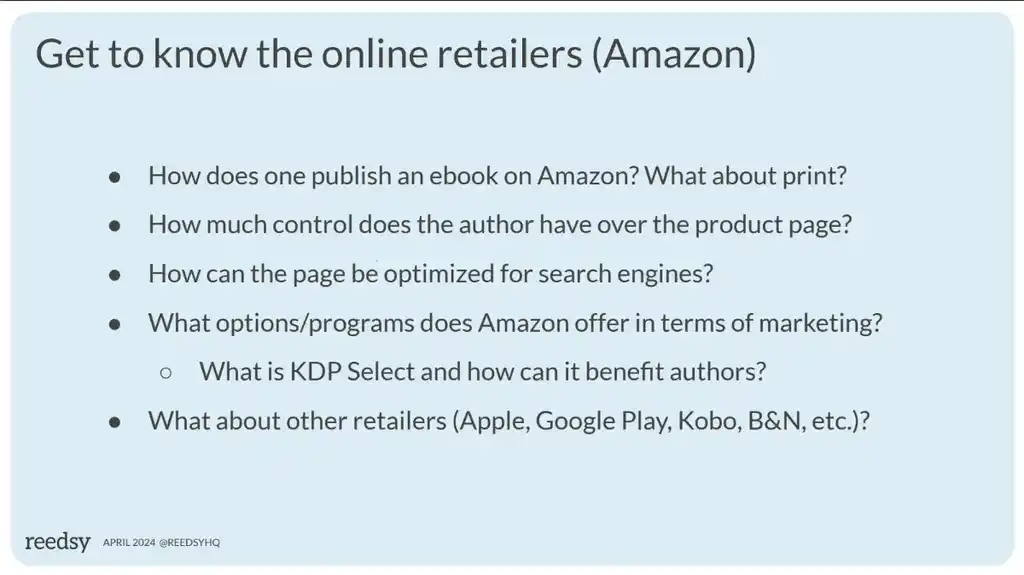
If you're going to be helping authors market a book, you need to know how one publishes an ebook on Amazon in the first place. And what about print, whether paperback or hardback? How do you record and publish an audiobook? How much control does the author have over the product page? Can they change the title? Can they change the price at any point? Can they change the cover or the product description? Can they unpublish the book and republish it? What are the options available to them?
All of this is going to be an integral part of their marketing strategy, because let's say you can’t change the title or the cover of a book. That restricts you quite a bit in terms of what you can do for a rebrand, for example.
How can the page be optimized for search engines and how does the Amazon search engine work? How do the other search engines work for other retailers? Apple, Google Play, Kobo, etc. That's also something you should be familiar with.
And finally, what options and programs does Amazon offer in terms of marketing? For example, Amazon offers a special tool called KDP Select which requires authors to be exclusive, and that offers a ton of advantages. The main one being the ability to include the book in Kindle Unlimited, which is Amazon's subscription program. There are a lot of authors out there who make the vast majority of their income through pages read on Kindle Unlimited. So you need to be able to advise authors on whether KDP Select in Kindle Unlimited is a good option for them.
All of these are questions that you need to be able to answer. Obviously we don't have time to go through them all in this presentation, so here are a few resources, focused on Amazon. With a bit of research, you can learn about the other retailers as well.
Amazon KDP (blog post)
Everything You Need to Know About Amazon Algorithms (free 10-day course)
The Best Print on Demand Services (blog post)
We have a guide that shows you everything you need to know about Amazon KDP — Kindle Direct Publishing, the platform through which authors can self-publish their books on Amazon — and a free 10-day course on Amazon algorithms, which I wrote and recently updated, that's going to tell you a little bit how the algorithms work. Once you start selling well on Amazon, the algorithms can carry your book very easily and get you more sales. It’s a question of how to harness those to maximum impact. Finally, there’s a blog post on print on demand services. The best way for an author to make their book available in print is through print on demand; someone buys the book and the retailer automatically prints it, and ships it to the customer. That's the way most indie authors make their books available. Even small and medium-sized publishers use print on demand more and more nowadays.
You also want to be familiar with tactics and channels for selling books. The main ones are discount promotions and promo sites. You might have heard of Bookbub, the most famous promo site, but there are a bunch of other ones out there.
Essentially, they've acquired an audience of readers interested in book deals and they make that audience available to advertisers, so publishers and authors. For example, if you're an author, you can discount your book to $0.99 for a week, and you can book slots on those price promotion sites, and more importantly, in their newsletters, so that they email their readers about your promotion. That's one of the easiest ways authors have at their disposal to market their books.
Another one is social advertising. I talked a little bit about meta ads earlier. That’s still a really, really strong channel. Amazon advertising is another really important channel because you can advertise your books in the same place where all readers go to search for their next read. Obviously they're more expensive placements, but they're much more powerful in terms of conversion.
Email marketing, as I mentioned, is also really important. You should be able to counsel authors on their list building, on their newsletter swaps, group promotions, et cetera. That’s when authors team up with other authors to co-promote their books. A newsletter swap is when an author promotes a book from a fellow author in their newsletter.
Finally, TikTok has become huge in the past few years. It's become one of the primary sources of book recommendations for readers. A lot of genres rely heavily on TikTok for sales, so that's another area you might want to look into and potentially specialize yourself in.
There's a bunch of ways to market books, but these are the main ones that I recommend you learn about. The best way to learn more about those is my book, How to Market a Book, that I published a few years ago. I've updated it several times since so all the information in there is up to date. I'd say the only thing it's missing is a chapter on TikTok because I’m neither a fan nor very accomplished on that platform. But everything else you're going to find in the book. Moreover, the book points to a lot of external resources. I would say that if you read this book 2 to 3 times and investigate the recommended resources there, you’ll pretty much learn 90% of what you need to know as a book marketer.
Obviously, things keep changing. New channels and new opportunities appear, so you need to stay on top of the industry. But the book will provide the basis you need to start offering your services to authors. You can also subscribe to my book marketing newsletter, where I send new tips or ideas every couple of weeks.
Learning by doing
Finally, I think that one of the best ways to learn is by just doing. That's how I learned a lot of things. There's only so much material you can read or watch. Digital marketers in particular like to get their hands dirty and play around with stuff.
You can definitely do that. You can create an account, for example, on Kindle Direct Publishing and create a fake book and go as far as pressing the publish button. That way, you're going to go through the whole process that an author would go through if they wanted to publish a book on Amazon. You're going to see what kind of decisions they have to face and just by doing that you'll be able to help an author publish a book on Amazon the next time.
If you really want to actually go through the whole process and get a book out there, just publish a short story. If you have zero creativity and don't want to write a 2000 word short story, you can use AI generation tools to create one for you. I'm not a big proponent of that, but that option exists. There are thousands of people every day who are publishing AI generated stuff on Amazon. So if you want to do that just for training purposes, you can do it. Don't expect that book to sell though.
Don't hesitate to get your hands dirty. Get on these different platforms, sign up for a BookBub account, sign up for a Reedsy account, sign up for all the accounts of all the tools that I mentioned in the book, and start playing around with them. That's one great way to get some experience before you take on real clients.
Building a portfolio and getting real clients
Once you have a good basis of knowledge on the book industry and book marketing, you can start building your portfolio. As a marketer with some experience in digital marketing, you already have a lot of skills that the vast majority of authors won't have. So, even if you don't have a complete knowledge of the publishing industry, you can already be of help to a lot of authors.
But where do you find your first clients? I would recommend looking among friends and family first. Nowadays, I think 80% of people want to publish a book in their lifetime and it has become more and more accessible, so I'm pretty sure that if you look among your network of friends and family, you're going to find someone who you could help market a book. You could look at where they're selling it, how they set it up, what their cover looks like, and maybe run some ads or do a few consultations with them on how their book has done so far in terms of sales.
You can also look on forums. One of our most successful cover designers on Reedsy got started designing covers on Reddit. He was a really great graphic designer who had no experience designing covers, so he offered to do covers for free for three authors on a self-publishing subreddit. Obviously, that’s pro bono work, but it helped build his portfolio and is actually how I found him. I thought his covers were really amazing and made an exception to invite him to Reedsy despite not meeting our formal selection criteria (find them here). He’s become one of our most successful designers on the marketplace since then. So, though I’m not a huge proponent of pro bono work, it can be an option if you’re just looking to build up your portfolio and get your first clients.
When I got started in book marketing I had a lot of knowledge through Reedsy, but I hadn't advertised the books of any author out there. So I contacted a couple of authors I knew and asked if they would mind me running some ads for free. The vast majority said yes, so that’s how I got my first clients. I ran ads for them for a couple of months and it not only built my portfolio, but was a great learning experience.
Advertising as a gateway
Facebook ads are a great gateway into book marketing. That's how my partner Sarah got started, because usually digital marketers will have some familiarity with Facebook ads. Even if you don't, if you have some experience with digital marketing tools or any other advertising platform, Facebook ads are not that hard to get a grip on. Just read the couple of chapters I have in the book on Facebook ads, and you will be able to start creating some ads for authors. And if you're a little bit analytical, you'll be able to look into the results, analyze them, run tests, et cetera.
I think it's a fairly simple gateway. It also won't negatively impact the other activities that the author is doing. If they're not already running Facebook ads, you can just ask them if they mind if you start running Facebook ads without charging for it. You'll just have to pay for the cost of the ads. I'm sure you will find authors out there who will say yes, and that's how you can build up a portfolio.
By working with these authors, not only will you get a better sense of the Facebook ads platform for books in particular, but you'll also learn about their overall marketing strategy, right? They'll probably run discount promotions while you're running the ads, and you can learn a little bit more about what they do to market their books, what metrics they look at, et cetera.
Another good gateway is Amazon ads. Unless you've worked with Amazon sellers in the past, you probably don't have experience running Amazon ads specifically. If you do, that's amazing, but if you don't, I've written this book on Amazon ads for authors. It’s been recently updated and is basically a step-by-step guide to successfully advertising books on Amazon. Obviously, it's my method for Amazon ads; there are other experts out there who have slightly different takes. But I’m 90% confident that if you read this book and start implementing the tactics with some of your clients, you should see some results, or at least you should be able to very quickly identify whether Amazon ads can be a good channel for them or not.
Expanding your knowledge and client base
The third step, once you’ve had a few clients, is to keep building up your experience, your knowledge, and your client base. The best way to get more clients is to leverage word-of-mouth. Authors generally know other authors, whether that's through social media or conferences. So, if you do a good job for an author, usually you'll get recommended, especially because there are not a lot of marketers out there doing a good job and specializing in book marketing. They’re in pretty high demand.
When you find your clients through referral, there’s the risk that you're going to get specialized. You might end up working only with authors in one genre or only perform one service. For example, if your first client is an epic fantasy author, usually the other authors they'll know will also be epic fantasy authors. Or if the first thing you do for your first client is Facebook ads, and you're really, really good at it, they'll recommend you to their friends for Facebook ads.
So, you might end up just running Facebook ads and not necessarily learning about other things. I wouldn't say that's a bad thing though, because the more specialized you can get, whether that's in a genre or in a particular channel, the better you'll get at it and the more word-of-mouth you're going to get. If you're really good at one thing then it’s going to be easy to market yourself and for authors to recommend you to their friends.
Building skills on the side
I wouldn't be afraid of over-specialization because it's easy enough to keep building other skills on the side. Maybe all you do for the first year is run Facebook ads for epic fantasy authors. But, maybe on the side you start playing with Amazon ads. Then you can ask one of the clients that you trust the most if they would mind if you ran Amazon ads for a month as well, or whether you can work with them on their next launch. They'll probably say yes.
It's easy enough to build skills on the side and diversify yourself. But over-specialization can often be a good thing because you build a lot of trust among authors that way. Authors are immediately able to understand exactly what you're going to do for them, whereas Jacks-of-all-trades can be seen as less trustworthy, or a little bit all over the place.
We're going to talk later about applying to Reedsy, but when you apply to Reedsy, we much prefer seeing a specialized profile with very clear experience in that channel or in that genre, rather than someone saying they can do everything for anyone.
Reedsy services
There are a few different services you can offer on Reedsy, such as copywriting or retailer page audits.
Copywriting & retailer page audits
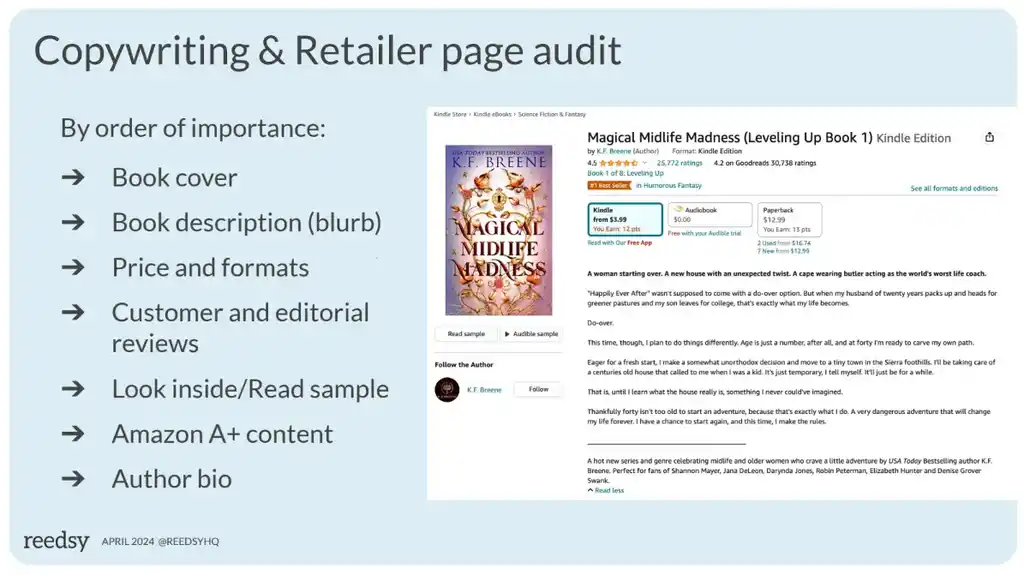
Authors are usually very good at writing novels or nonfiction books but they might not always be very good at writing copy — in particular, at writing their book description. That is an entirely different skill set, so some authors outsource the copywriting of their product description to marketers or agencies. So if you have copywriting experience, that's another really good gateway. Look at the top 10 books in a given category or genre, see how their blurbs are structured, and, taking inspiration from that, write the blurb for your client. For example, the first line in this example is bolded and is clearly a hook. It immediately conveys the essential elements of the book: the main character, the genre, and maybe an unexpected twist. This line is also filled with humor, which shows us the voice of the book.
This is a really high selling author, but that's how you can take inspiration from bestselling books to write copy for your clients. There are AI generative tools out there that can help with that. ChatGPT has gotten pretty good, for example, at writing book descriptions. It’s not great, but it can generate something you can take inspiration from. But if you have copywriting experience, you probably won't need that.
There's more stuff going on on a product page than the book description, so another common service is what I call the Amazon page audit, which is where a marketer will look at the cover, look at the description, look at the price, look at the customer reviews, and look at the metadata that's behind the page.
You need to have a really in depth knowledge and understanding of how to sell books on Amazon for that, but once you acquire that knowledge, it's definitely not rocket science. You can do a lot of these audits and you'll see that 90% of the time when authors come to you saying “my book is not selling” it's because it's not marketed properly: how the book is positioned, what the cover looks like, what the whole page looks and reads like. By just doing an audit and fixing that stuff on the page, they may not get sales out of the blue,but they will definitely be able to give their book a better chance at succeeding.
You can run Facebook ads. You can run Amazon ads. You can discount a book and do all the stuff you want but if the cover and the product description is not appealing, the book's not going to sell. That’s the first thing to fix. If you come with conversion rate optimization experience, you will be able to help a lot of authors.
Email marketing
Email marketing is another important element of my work. It can also be a really good service to offer. If the author doesn't have a list, you can help them set up their list, then, if they don't have a magnet — a way to draw people into the list — you can help them set up that as well. It's usually a free short story or free piece of content that authors give readers in exchange for a sign-up to their mailing list.
You can also help them set up a welcome automation for when people join their mailing list, or segment their list with multiple welcome automations, depending on how and where they join the list. You can give them advice on newsletters, how often to send them, what you put in them, help them write them, et cetera.
Launch plans
Finally, you can help authors plan their launches. This is probably the most rewarding and most exhaustive thing you can do as a book marketer because it requires you to put all your knowledge to use to promote an upcoming launch. It's not just going to be about advertising or email marketing or writing copy. It's going to be about all of those things, plus a lot of strategic thinking.
It's more rewarding because you work hand in hand with the author on a proper strategy that they implement on their own afterwards, or you may help them implement, by, for example, running their ads.
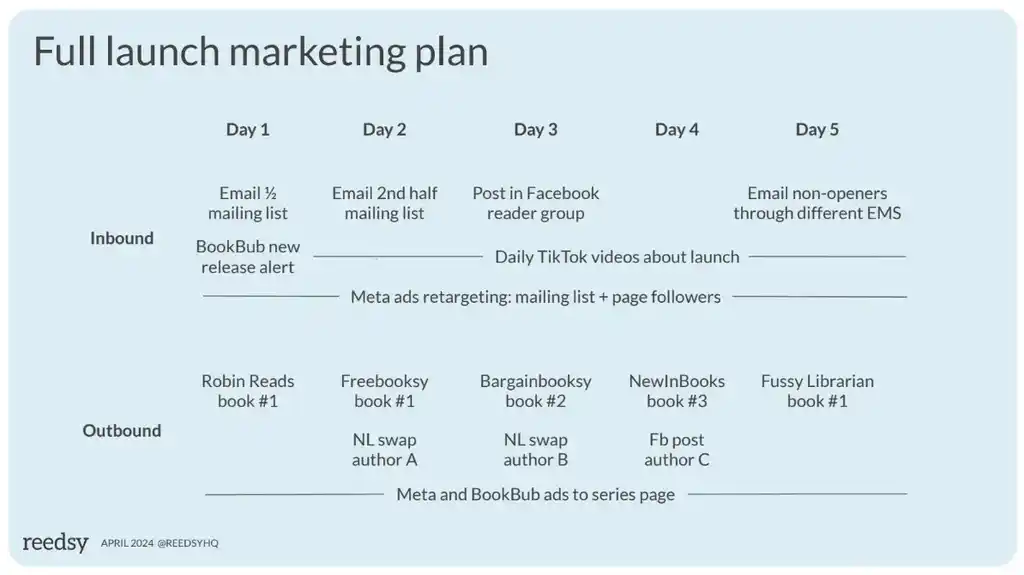
This is what a full marketing launch plan could look like. I've created several of these for authors and you usually work with them over at least a couple of months so that you really help them launch their book and get a maximum number of sales during the first 30 days — all retailers reward authors with extra visibility during the first 30 days. This is one of the key parts of almost all retailers' algorithms, which is why marketing launch plans like this are so important because they're going to tell the author exactly what they should do during that period and before in order to maximize their sales at launch.
Launch plans take a lot of research, so at first I recommend you start working in email marketing or advertising or copywriting, while you learn more about publishing and book marketing and get more familiar with that. With a few months or even a year of experience, you can start offering more holistic services that require a lot more knowledge and time.
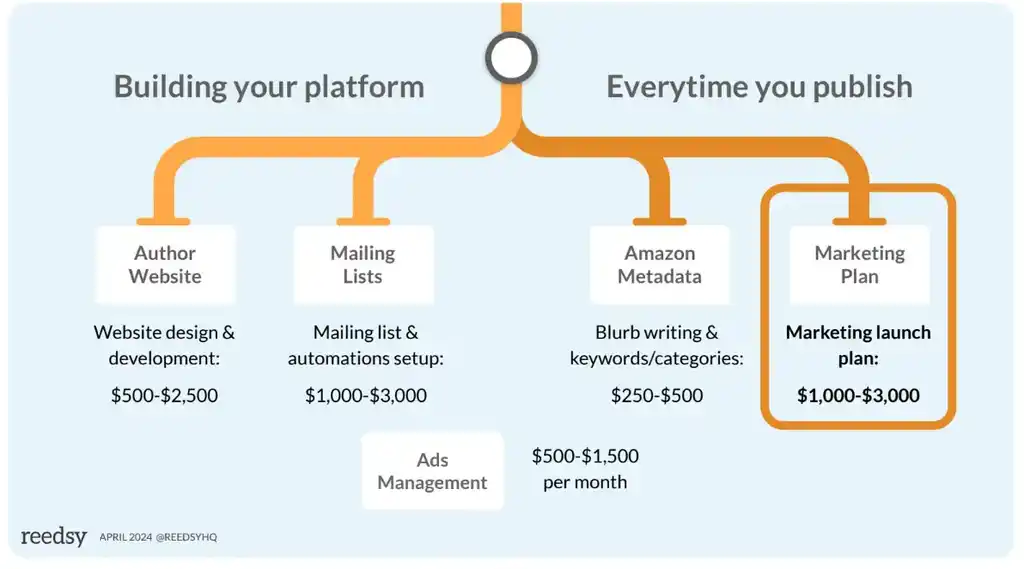
Applying to Reedsy
The final step, once you know you've gotten a bit of experience and you've built up your portfolio, is to apply to become a Reedsy marketer. We're very, very selective about the people we let on the marketplace and accept less than 5% of applications, so make sure to get the knowledge, and build your experience first.
To apply, you just have to create your profile. The most important thing you put on the profile is your projects and your portfolio.
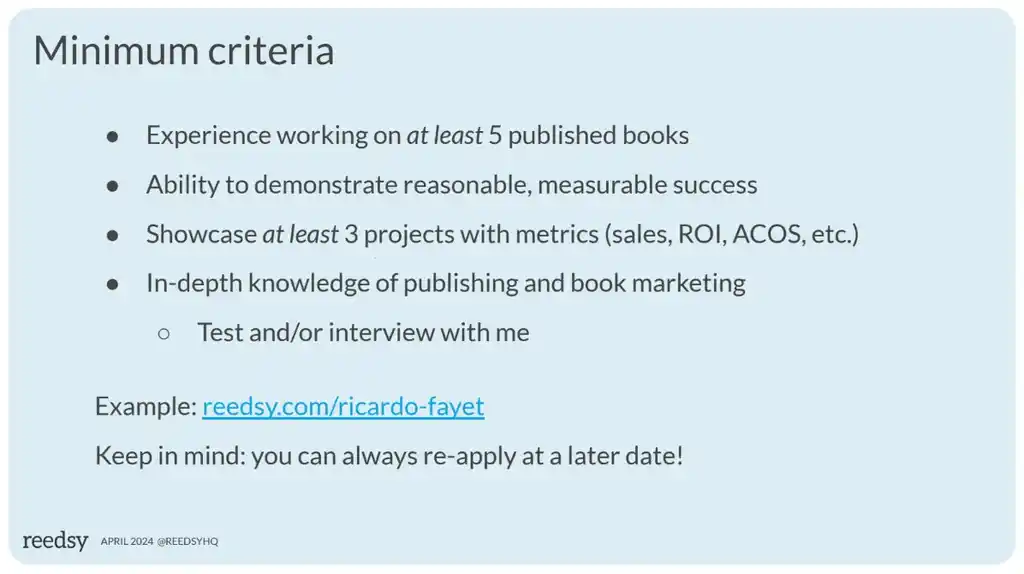
It makes no sense to apply to Reedsy if you've never worked with authors or with publishers or on books before, even if you have a lot of digital marketing experience. We’re looking for people who have that experience, but have also worked on at least five published books. We're very rarely going to make an exception to that.
The second criteria is the ability to demonstrate reasonable and measurable success. If you've worked with 10 authors, but their books haven't sold a copy, then that's not a really good sign for us.
One of the ways you can show that reasonable and measurable success is through the project section. Projects are basically places on your profile where you can show what you've done on a specific title, what kind of campaign you've run. You don't need to have a bestseller on the profile, but you do need to indicate what you've done for at least three projects. Have you run Facebook ads? Have you run Amazon ads? Did you build out the author's email list? Did you create a marketing launch plan? Did you write the copy for the product description, et cetera. Then, give an idea of how it worked. What was the ROI if you ran ads? How many sales did the book get if you worked on the launch plan? If you rewrote the copy for the blurb, what were the sales before with a prior and what were the sales after?
Finally, we will require in-depth knowledge of publishing and book marketing, which we will verify either through a test that I'm putting into place or a personal interview with me, in which I usually ask a few questions to test your knowledge about publishing and book marketing in particular.
You can try applying to become a marketer once you've got three projects under your belt with good results. You might not get accepted, but you can always reapply at a later date, or start filling in your profile and keep filling it in until you’re ready.
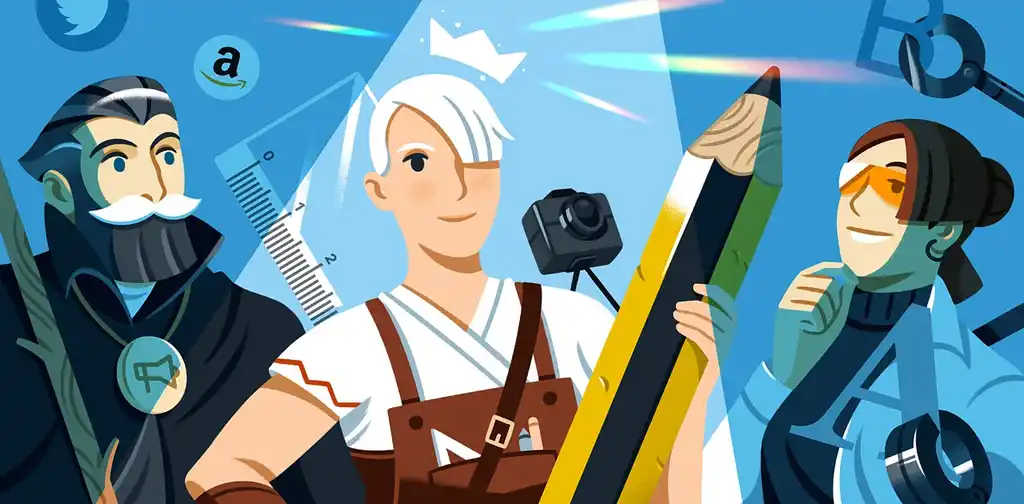
FREE RESOURCE
Reedsy Profile Checklist
Make sure you tick all the boxes on your Reedsy profile by referring to our handy checklist.
Q&A session
You mentioned a lot of authors tend to meet at conferences. I know you speak at quite a few of them. Do you find yourself learning a lot from their firsthand experiences?
Ricardo: Yes, that’s one of the best ways to learn about publishing and the indie author world, as well as book marketing in general: attending conferences. It’s also a great place to meet your first client.
What does the $1,000 to 3,000 marketing plan include? And will there be fees that must be paid to Amazon Marketplace in addition?
Ricardo: The prices that are put on the slides are averages that we see on our marketplace, so it doesn't mean that every marketer is going to charge in that range for a marketing launch plan. It will depend a lot on what kind of launch we're talking about. If we're launching a new pen name or a new series, there might be more work involved than if we’re just launching a standalone, for example.
But what the marketing launch plan usually includes what I showed earlier.
So all the pre-publication work as well as things like how to get reviews at launch through building a team of advanced readers, how to get sales during the first five days, maybe run a price promotion, et cetera. That's the gist of the marketing plan.
In terms of fees, Amazon takes a cut on every book sale, but there are no fees. Reedsy charges a 10% fee on both sides.
Do you have publishing professionals with multiple profiles on Reedsy? E.g. editors who also do marketing or designers who also edit?
Ricardo: No, not really. There can be some exceptions, but there are very few profiles for whom it would make sense. As I said, we're more into specialization than being a jack of all trades.
Maybe we have one or two editors who also have a ghostwriting profile, but even from a technical perspective, that involves having a separate Reedsy account and keeping both accounts under different email addresses. It’s not something we recommend.
Where does word of mouth and Facebook community groups fit into the marketing strategy for an indie author?
Ricardo: Word of mouth is at the core of any marketing strategy and also not really in the strategy itself. It's something you don't really have control over from a marketing perspective. The only thing you can do to generate word of mouth is to write a really, really amazing story that captivates readers and makes them want to share it with other readers. That happens at the writing stage and it's more a question of craft and learning about market tropes than marketing.
But any marketing is going to depend a lot on word of mouth, because if you generate one sale with your marketing and that sale through word of mouth turns into 20, it becomes instantly a lot easier to market your book. That's effectively how bestsellers are born. An author who sells a million copies doesn't usually spend a million dollars on Facebook to sell those million copies. They're going to spend maybe a small amount on Facebook ads and then word of mouth is going to kick in. That's where they make their money.
I see Facebook groups as helpful for making connections among authors more than finding readers. You might find some advanced readers or people for your street team, but it’s not the best place to find readers. Otherwise authors would be spamming Facebook groups all day with links to their books, which a lot of them already do.
Does the marketer also create content for the author's personal Facebook and Instagram account?
Ricardo: They can. That's up to what you want to do as a marketer and what the author wants or needs. I know marketers who do that. Ad content can be reused organically as well.
How do you help authors get Goodreads and Amazon reviews?
Ricardo: I haven't talked a lot about reviews because reviews come through sales. I think a marketer's job — and even an author's job — should be to get sales. With sales, reviews will come in organically when you launch a book. It's true that in the beginning you have a bit of a chicken and egg problem because it's hard to get sales without at least a few reviews ,and it's hard to get reviews if you don't sell your book.
There are ways around that, like building a street team of advanced readers to whom you send advanced reader copies, in exchange for a review when it launches. As a marketer, you can help an author build their street team with a caveat that it should really be the author communicating with those advanced readers to have that personal element in there. I think it's a lot less effective if it's the author's assistant or publicist or a marketer who communicates with those readers.
Martin: I think that brings us to a close. Thank you, Ricardo, for sharing all that with us. A lot of great detail, a lot of great information.
Here are the slides from the presentation.
Thanks everyone!
For more tips on how to showcase your expertise, get more freelance clients, or notifications about events like this, follow us on LinkedIn.
Reviewed by Linnea Gradin
The editor-in-chief of the Reedsy Freelancer blog, Linnea is a writer and marketer with a degree from the University of Cambridge. Her focus is to provide aspiring editors and book designers with the resources to further their careers.
As the editor of Reedsy’s freelancer blog and a writer on the Reedsy team, Linnea has her hand in a bit of everything, from writing about writing, publishing, and self-publishing, to curating expert content for freelancing professionals. Working together with some of the top talent in the industry, she organizes insightful webinars, and develops resources to make publishing more accessible to writers and (aspiring) publishing professionals alike. When she’s not reading, she can be found dribbling on the football pitch, dabbling in foreign languages, or exploring the local cuisine of whatever country she happens to be in at the time.


